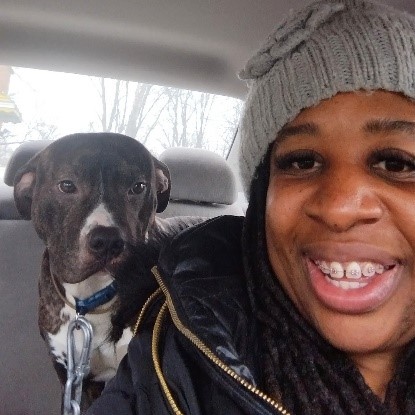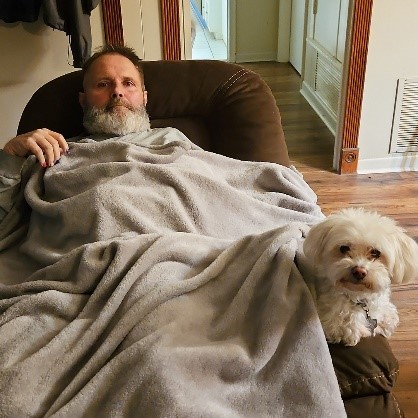Cancer Patients Risk Losing Their Pets, CancerCare Survey Finds
Can you imagine being diagnosed with cancer and then having to give up your pet?
The mission of CancerCare’s Pet Assistance & Wellness (PAW) Program is to help people diagnosed with cancer stay together with their beloved pets. Cancer impacts many aspects of each person’s life, from physical health to mental health, employment, finances, relationships and the ability to care for and keep a pet. For many of our clients, especially those that live alone, a pet may be their primary, or only, source of support throughout their cancer experience. The many stressors of a diagnosis, however, can put that cherished relationship with their pet at risk.
The PAW Program surveyed 244 CancerCare clients who have been diagnosed with cancer and have a dog or cat in their home to learn more about the specific pet care challenges they face and how vital a pet’s love and support can be throughout treatment.
A pet’s unconditional love
In our survey, 92% of respondents reflected that their pet was extremely important throughout their cancer diagnosis. Many used the words “family” and “unconditional love” to describe the special relationship shared with their pet.

“She was my one and only 24-hour companion. She would always be by my side. When she would hear me crying, she would literally come up to me and lick my tears away. She was always cuddling with me and just giving me pure unconditional love.”
– Brunilda and Mia

“He knows when I was hospitalized and when I came home and couldn't do anything, he was there to give me hugs. He is there when I'm having an emotionally bad day to keep me company and to cheer me up. He will come give me hugs and snuggle when the hard days get to be too much.”
– Ursula and Manny

“Since my brain surgery, I have been confined to a wheelchair due to nerve damage that caused my left side to be flaccid. Just knowing he's there is very comforting. He sits in my recliner with me every day on my left side.”
– John and Samson
Pet care challenges
Cost is the primary pet-related difficulty our survey respondents reported facing, as 87% had difficulty taking care of their pet during treatment because of the expense.
Prior to being diagnosed with cancer, the majority of survey respondents reported that they were able to afford essential pet care such as pet food (93%) and vet visits (91%). After their cancer diagnosis, three-quarters reported they found it difficult or impossible to manage the costs of pet food (77%) and vet visits (78%).
One of our clients, Rob, shared “Vet expenses are hard when paying for all the ‘extras’ that come along with cancer (i.e. vitamins, OTC creams, protein drinks).”
Another client, Florida, shared, “After paying the copays, there was not enough money to buy the food or treats they were used to getting. I had to buy the least expensive food I could find.”
Further difficulties pet owners face while undergoing cancer treatment include:
• More than half (59%) had trouble walking their dog.
• Two-thirds (67%) had trouble taking care of their pets because of an inability to walk, lift or bend down.
• 86% needed part-time or occasional help caring for their pet.
Facing the loss of a pet
While a pet’s love is vital, nearly half (44%) of our survey respondents said that at some point during their cancer treatment, they worried they might not be able to keep their pet.
Facing this loss, clients said they felt:
• “awful and heartbroken”
• “grief stricken and depressed”
• “it was more difficult than the day I got diagnosed”
• “I would stop my care first”
• “I would die before I would ever give my dogs up.”
More than one in ten (15%) said they even considered abandoning or pausing their cancer treatment in order to keep their pet.
Keeping people diagnosed with cancer and their pets together
Pets are family and offer essential support and companionship to their owners who have been diagnosed with cancer. CancerCare’s PAW Program is dedicated to celebrating that special bond, and helping these families stay together.
Karen, one of our clients who received financial assistance from the PAW Program shared, “If it was not for my grant from CancerCare for Angel, I do not know if I would have been able to keep her. I am so blessed to have her. She is my rock that keeps me fighting for my life. I have now lived four years longer than was thought and I owe a lot to Angel for being there for me. I also thank CancerCare for their grant which allowed me to feed Angel and have her by my side through this cancer. Thank you, CancerCare, for helping me to live.”
The PAW Program offers:
• Limited financial assistance to qualified individuals who are in active treatment and share their home with a cat or dog.
• Education focused on navigating the challenges that can arise when caring for a pet while also trying to care for yourself.
• Helping Paws (www.cancercare.org/helpingpaws), a searchable online database of low-cost and free pet care services.
• CancerCare’s resource navigation, counseling and support groups, all free of charge.
To learn more about the PAW Program, visit www.cancercare.org/paw.
If you’d like to support our mission of helping people diagnosed with cancer stay together with their beloved pets by donating, please visit www.cancercare.org/paw-donate or reach out directly to bmorvant@cancercare.org.
